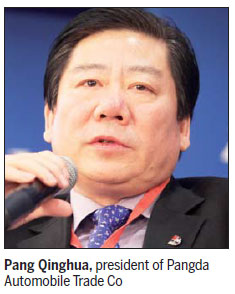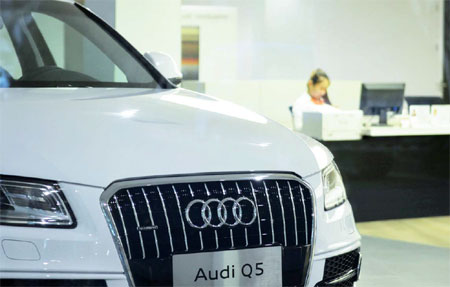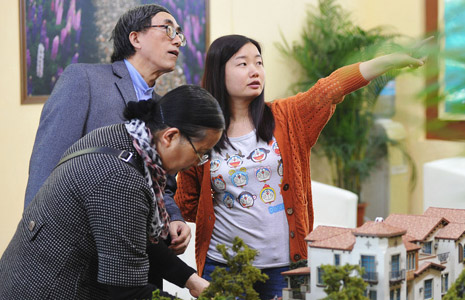Probes prompt call for urgent changes to auto sales rules
Updated: 2014-08-15 10:18
By Wang Chao and Andrew Moody(China Daily Europe)
|
|||||||||||

Sales, parts and maintenance system still cast in stone by manufacturers
Although the Chinese government launched antitrust investigations of only Audi, Chrysler and 12 Japanese spare parts companies, the probes have caused tremors among foreign car brands.
Prices have been cut, starting with Jaguar Land Rover on July 25 and continuing with other imported or premium brands.
BMW said it would reduce parts prices by 20 percent starting August 11, Mercedes-Benz announced a drop in parts prices of 15 percent as of September, and GAC Toyota and GAC Honda also announced cuts in the prices of some parts. And the domino effect continues.
Audi admitted it had violated the monopoly law in an Aug 11 statement, and auto insiders estimate that the company may have to pay a fine of at least 1.8 billion yuan ($292 million, 218 million euros), equivalent to 1 percent of its revenue last year.
Dong Yang, secretary-general of the China Association of Automobile Manufacturers, says the association applauds the antitrust probes into luxury brands because they were earning ridiculously high profits and it should be corrected.
Although foreign premium brands often blame high tariffs and taxes, the prices they were charging in China were far higher than taxes would justify.
For example, the luxury compact SUV BMW X3 is sold for 300,000 yuan in developed markets, while in China the price is 900,000 yuan.
After adding in the import tariff (25 percent), the value-added tax (17 percent), and the consumption tax (varies by cylinder size), the price should be lower than 550,000 yuan.
The extra 350,000 yuan has been revenue that has gone to the dealers in China, experts say.
Dong says the investigations can curb the prices of imported and premium cars and help create a fairer market.
"It is legitimate for companies to chase after profit, but they should seek a balance between the margin and the consumer," Dong says.
Dong is a former general manager of BAIC, a major automaker based in Beijing, which has subsidiary joint-venture companies, BAIC Hyundai and BAIC Mercedes-Benz.
He recalls that during his term, he found dealers preferred selling imported Mercedes to joint-venture cars "simply because they got more commission by selling imported cars".
Some Western media have responded with accusations that China's investigations are a new kind of protectionism that aims to help domestic automakers. But Dong says that the price cut won't change these brands' premium status, as these cars are still much more expensive than most domestic cars, even after price cuts.
Shi Jianhua, deputy secretary-general of the auto manufacturers association, says the investigation may even hurt Chinese brands since "the value of premium cars will increase after price cuts, and it encourages customers to trade up for better models".
Figures from the association show that from January to July, the market share of domestic brands was 37 percent, down 3 percentage points from the same period last year. At the same time, foreign brands took in about 80 percent of the profits generated by the industry.
Analysts warn customers that the price cuts are just companies' way of trying to avoid a big fine, so they shouldn't celebrate too soon.
Based on China's anti-monopoly law which came into effect in 2008, companies ruled to be monopolies face a fine ranging from 1 percent to 10 percent of their revenue from the previous year.
"Companies cooperative with the government so they can avoid the heaviest penalty," Shi says.
This has been shown to be true in prior cases. Last year, when the government initiated antitrust investigations of foreign milk powder companies, several brands were spared penalties because they were cooperative, while six companies were fined for what some analysts called a "bad attitude" toward the investigation.
Twelve auto parts companies also are being scrutinized.
The current practice is for foreign brands to provide parts to authorized retail stores, and consumers have to pay top prices to get their cars - especially imported cars - repaired or serviced in these stores. A 200 yuan part can be sold for as much as 5,000 yuan to a customer, according to Zeng Zhiling, managing director of LMC automotive consulting (Shanghai) Co, a provider of automotive industry forecasts and intelligence.
An employee of a foreign car dealership who asked for anonymity to avoid losing his job says the dealership is required to procure a certain number of parts every year from the automaker, but not all of them are used if repairs are fewer than anticipated. As a result, those parts are sold off to other companies at a much cheaper price, which the employee says is strictly prohibited by the foreign brands, "but it happens".
Domestic parts manufacturers are under more competitive pressure than automakers.
In 2006 China reduced the import tariff on parts to 10 percent to comply with World Trade Organization regulations, and the Chinese parts industry suddenly had to confront strong foreign rivals.
"The domestic brands haven't gained consumers' trust, and foreign parts are purchased through authorized sales," Shi from the automobile association says.
Pang Qinghua, president of Pangda Automobile Trade Co, says cutting prices is not the solution for the monopolies in parts sales. Instead, the exclusive authorized sales system in China needs to change, Pang says.
Pangda is among the top three automobile trading companies in China, and it sells multiple brands including most foreign ones.
"Dealers have very little say in the pricing process," Pang says. "It should be up to auto dealers to decide the parts and maintenance prices, but in reality automakers make all the decisions for us and even set minimum prices for some models.
"In tough times, these requirements may end up leaving us with a huge inventory, which is a huge financial strain for dealers," he says.
The Chinese pricing system dates back to 20 years, when China started to introduce the first foreign car brands. To help those companies develop a distribution system, the Chinese government set up a guideline on auto brands management. The guideline laid the foundation for the current authorized sales system.
In recent years, more dealers have complained that the system has led to price monopolies for foreign brands.
Dealers also complain that they have to follow the brands' requirements to build lavish stores to boost the brands' image even as the number of customers per dealership declines, which adds to dealers' burden.
"It was necessary to have such a guideline back then because the demand outstripped the supply, but now the sales system is outdated because supply far outweighs demand. We dealers have to have a bigger say in the market, instead of listening to the brands," Pang says.
Contact the writers through wangchao@chinadaily.com.cn
|
Audi admitted it had violated the monopoly law and auto insiders estimate it may have to pay a fine of at least 1.8 billion yuan. Provided to China Daily |
(China Daily European Weekly 08/15/2014 page8)
Today's Top News
British Chinese call for memorial to WWI workers
Pollution control set as priority for APEC meeting
Swimmer nabs silver at Gay Games in the US
China exports to Russia to surge
Chinese economic crime suspects repatriated
Ukraine deaths double in 2 weeks
Sensitive times in the making
Chinese film fans mourn for star
Hot Topics
Lunar probe , China growth forecasts, Emission rules get tougher, China seen through 'colored lens', International board,
Editor's Picks

|

|

|

|

|

|






